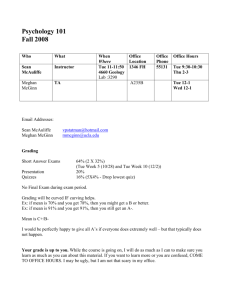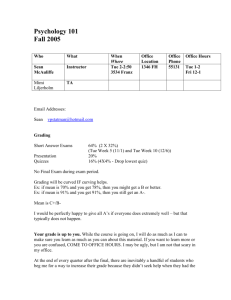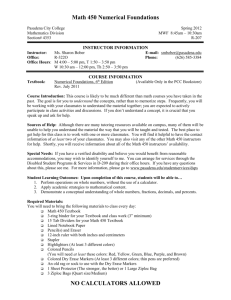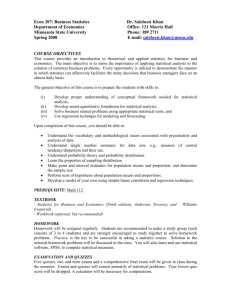Biology 1 - General Biology #21073 & #21074 Fall 2015
advertisement
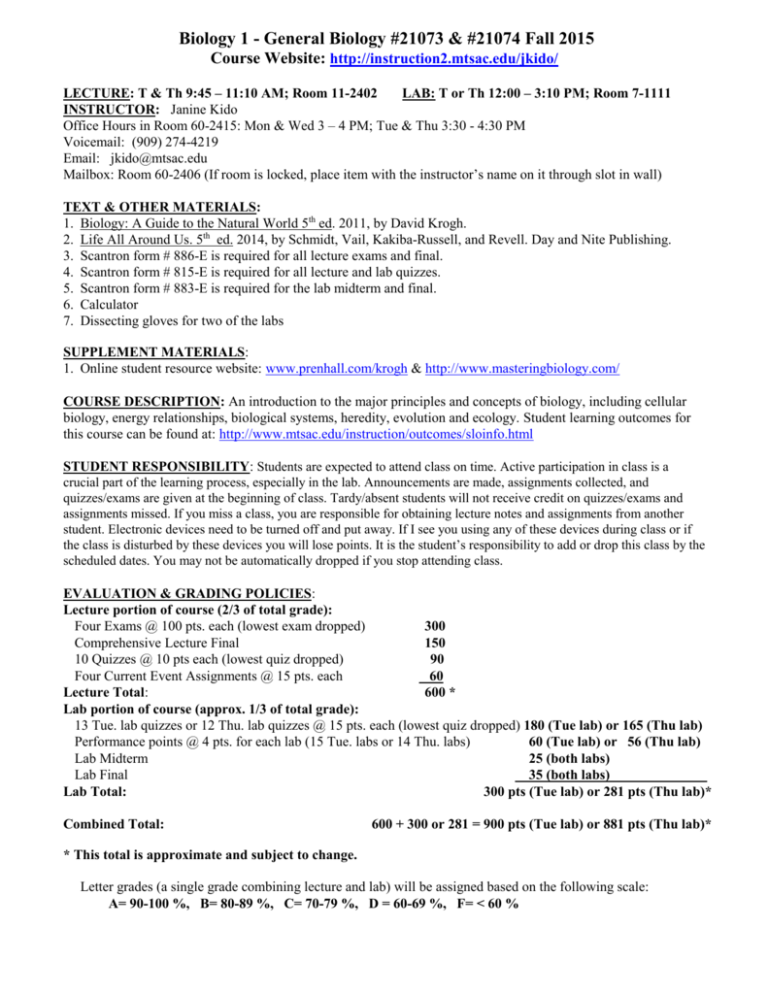
Biology 1 - General Biology #21073 & #21074 Fall 2015 Course Website: http://instruction2.mtsac.edu/jkido/ LECTURE: T & Th 9:45 – 11:10 AM; Room 11-2402 LAB: T or Th 12:00 – 3:10 PM; Room 7-1111 INSTRUCTOR: Janine Kido Office Hours in Room 60-2415: Mon & Wed 3 – 4 PM; Tue & Thu 3:30 - 4:30 PM Voicemail: (909) 274-4219 Email: jkido@mtsac.edu Mailbox: Room 60-2406 (If room is locked, place item with the instructor’s name on it through slot in wall) TEXT & OTHER MATERIALS: 1. Biology: A Guide to the Natural World 5th ed. 2011, by David Krogh. 2. Life All Around Us. 5th ed. 2014, by Schmidt, Vail, Kakiba-Russell, and Revell. Day and Nite Publishing. 3. Scantron form # 886-E is required for all lecture exams and final. 4. Scantron form # 815-E is required for all lecture and lab quizzes. 5. Scantron form # 883-E is required for the lab midterm and final. 6. Calculator 7. Dissecting gloves for two of the labs SUPPLEMENT MATERIALS: 1. Online student resource website: www.prenhall.com/krogh & http://www.masteringbiology.com/ COURSE DESCRIPTION: An introduction to the major principles and concepts of biology, including cellular biology, energy relationships, biological systems, heredity, evolution and ecology. Student learning outcomes for this course can be found at: http://www.mtsac.edu/instruction/outcomes/sloinfo.html STUDENT RESPONSIBILITY: Students are expected to attend class on time. Active participation in class is a crucial part of the learning process, especially in the lab. Announcements are made, assignments collected, and quizzes/exams are given at the beginning of class. Tardy/absent students will not receive credit on quizzes/exams and assignments missed. If you miss a class, you are responsible for obtaining lecture notes and assignments from another student. Electronic devices need to be turned off and put away. If I see you using any of these devices during class or if the class is disturbed by these devices you will lose points. It is the student’s responsibility to add or drop this class by the scheduled dates. You may not be automatically dropped if you stop attending class. EVALUATION & GRADING POLICIES: Lecture portion of course (2/3 of total grade): Four Exams @ 100 pts. each (lowest exam dropped) 300 Comprehensive Lecture Final 150 10 Quizzes @ 10 pts each (lowest quiz dropped) 90 Four Current Event Assignments @ 15 pts. each _ 60 Lecture Total: 600 * Lab portion of course (approx. 1/3 of total grade): 13 Tue. lab quizzes or 12 Thu. lab quizzes @ 15 pts. each (lowest quiz dropped) 180 (Tue lab) or 165 (Thu lab) Performance points @ 4 pts. for each lab (15 Tue. labs or 14 Thu. labs) 60 (Tue lab) or 56 (Thu lab) Lab Midterm 25 (both labs) Lab Final 35 (both labs)______________ Lab Total: 300 pts (Tue lab) or 281 pts (Thu lab)* Combined Total: 600 + 300 or 281 = 900 pts (Tue lab) or 881 pts (Thu lab)* * This total is approximate and subject to change. Letter grades (a single grade combining lecture and lab) will be assigned based on the following scale: A= 90-100 %, B= 80-89 %, C= 70-79 %, D = 60-69 %, F= < 60 % 1. Lecture quizzes will cover material since the last exam (except when previous material is necessary background for the new material or if specifically announced in class). Quizzes are given at the beginning of class so be on time. 2. Lecture exams will cover material since the last exam (except when previous material is necessary background for the new material or if specifically announced in class). Exams will consist of multiple choice, true/false, matching, short answer, and essay questions. NO MAKE-UP EXAMS WILL BE GIVEN AFTER THE SCHEDULED EXAM DATE & TIME! Students who miss an exam will have that count as the dropped exam. Students who are late will lose points. 3. The lecture final will be comprehensive and will be similar to the lecture exams. 4. The goal of the current event assignments (see instructions handout) is for you to become familiar with how applicable biology is to your daily life. You are required to turn in four current event summaries (15 pts. each), related to a topic we have previously covered since the last current event assignment. The fifth current event summary is optional and will count for 10 points of extra credit. 5. Lab quizzes will be given at the beginning of each lab period. If you enter class after I have passed the quiz out you will not be allowed to take the quiz. Quizzes will cover the previous week’s lab activities and information on the lab that will be completed that day, so please read ahead and be prepared for the up-coming lab. 6. Lab performance points will be given to students who attend the entire lab period, make an honest effort to complete all activities and clean up after themselves. Students who are tardy, absent, do not complete assigned class work, copy lab manual answers from others, leave class early and/or leave a messy lab station will not receive full points. If you miss a lab, you may attend another lab section. You may only do this twice. If possible, notify lab instructors ahead of time. Food and drinks are not allowed in lab. Closed-toed shoes must be worn at all times. All electronic devices must be turned off and put away. Performance points will be deducted if these rules are not followed. 7. The lab midterm will cover labs #1 - 7 while the lab final will cover labs #8 - 15. STRATEGIES FOR SUCCESS IN LECTURE: 1. Read ahead! Read the information in the text that goes along with the topics presented in the lecture outlines before the actual lecture. You can even start filling in the lecture outline on your own. By doing this, you will be familiar with the topics while the instructor is lecturing on them and the lecture will reinforce what you have read. The more you go over a topic the better you will learn and remember it! 2. During lecture, focus on what is being discussed so that you understand the concepts and why they are important to know. This may mean not sitting by your friends so that you can focus on the lecture. 3. During lecture, have the essay questions list out so when we cover a concept that is on the list, you immediately know what information you should focus on in order to answer that essay question correctly. 4. Immediately after each lecture, go over your lecture notes again along with your textbook in front of you so that you can look at the figures that were referred to during lecture. While reviewing your notes, make sure that you understand the concepts and relate them to your own life so that they are easier to remember. For example, when going over photosynthesis, one could look at a plant around the house and visualize how and why photosynthesis is happening in that plant. If you are unclear about a concept read the section in your textbook that discusses that topic. If you are still unclear about it, ask the instructor for assistance. 5. After each lecture, fully answer the essay questions on the topics that were just covered during that lecture. Make sure that your answers are written clearly and completely so that someone else, who is not familiar with the topic, can easily understand them. 6. Verbally discuss or explain the concepts that you have just learned with someone else. If you can explain that topic to someone else, that probably means that you understand it. STRATEGIES FOR SUCCESS IN LAB: 1. Fully read the lab exercises before we actually do each lab and make sure you understand what activities you will be doing and why you will be doing them. If possible, answer the lab manual questions that you are able to answer beforehand. 2. During lab, be involved in all lab experiments and activities and do not rely on your lab partners to do them for you. Explain and discuss experiment procedures and results with group members. Teaching others is the most effective learning method! 3. During lab, answer the lab questions in your lab manual on your own. Do not copy the answers from others. 4. After lab, review the concepts that you have just learned to give yourself another chance to understand them. Mt. San Antonio College Biological Sciences Department Policy on Student Cheating POLICY 1. No dictionaries, reference materials, notes, or programmable calculators may be used during any exam or quiz unless authorized by the professor. 2. No electronic devices, of any type, may be used during any exam or quiz unless authorized by the professor. a. Electronic devices include, but are not limited to: cell phones, smart watches, PDAs (personal digital assistants), earphones, cameras, MP3 players, translation devices, and electronic dictionaries. 3. No talking, signaling, sharing of note cards, calculators or other materials is allowed during any exam or quiz, unless authorized by the professor. 4. Only the materials required or authorized for an exam or quiz should be taken out of your notebook, backpack, pocket, or purse. All other materials should be put away as instructed, including electronic devices. 5. Students may not leave the classroom during an exam or quiz unless authorized by the professor. If a student leaves the room without permission, the test or quiz will be forfeited at that time. 6. This policy will be strictly enforced by all professors in all classes taught in the Department. CONSEQUENCES: 7. A single act of cheating or academic dishonesty in any form may result in as much as receiving an “F” in the course. 8. Action taken by the professor will be consistent with the college policy on cheating and academic dishonesty. In addition, a report regarding the violation will be submitted to the Director of Student Life for further action, which may also result in further disciplinary action, including, but not limited to suspension or expulsion from the college. WHAT IS CHEATING? Some examples of cheating include, but are not limited to: a. b. c. d. e. f. g. h. i. j. k. l. m. Plagiarism, which is the use of materials authored by another person or obtained from a commercial source or the use of passages without proper acknowledgment. Having or using unauthorized materials during any exam or quiz Notes concealed in or written on clothing, hats, or skin (as examples). Looking at another student’s work during any exam or quiz. Changing answers on a returned exam in order to claim there had been a grading error. Sharing any content of exams or quizzes with individuals who have not yet taken it. Removing an exam or quiz from the classroom without the professor’s approval. Taking photos of exams, quizzes, completed ScanTrons®, or exam keys. Turning in work that was generated by other individuals or by the same individual but in a prior semester, including but not limited to: lab report data, lab report or homework questions, homework assignments, and extra credit assignments. Working together on a lab experiment when told to work individually. Falsifying lab data. Allowing another student to look at your exam or quiz, or allowing another student to copy your homework, lab reports, or other assignments. (If that work is duplicated you may also receive the same penalties listed above for violation of the Biology Department Policy on Cheating, and the college policy on cheating and academic dishonesty.) Falsifying documents, including signatures. If you are unclear about what constitutes cheating in your class or for a particular assignment, please contact your instructor for clarification before the assignment is due. BIO 1 - SCHEDULE The following is a TENTATIVE schedule. I may make alterations if needed. WEEK/DATE LECTURE TOPIC READING The Scientific Method & What is Life? Ch. 1 1 Aug. 25 & 27 Chemistry & Life Ch. 2 & 3 The Organic Molecules of Life Ch. 3 2 Sep. 1 & 3 3 Sep. 8 & 10 The Cell Cell Transport Current Event 1 Due Thu. Sep. 10 Exam 1: Ch. 1–5 on Tue. Sep. 15 Energy Cellular Respiration Metabolic Rates Photosynthesis 5 Sep. 22 & 24 DNA & Protein Synthesis 6 Sep. 29 & Oct. 1 Cell Division Asexual & Sexual Reproduction Current Event 2 Due Thu. Oct. 1 7 Oct. 6 & 8 Exam 2 (Ch. 6 – 8 & 13 - 14) on Tue. Oct. 6 Biotechnology Ch. 4 & 5 Ch. 5 4 Sep. 15 & 17 Ch. 6 Ch. 7 Ch. 8 Ch. 13 & 14 Ch. 9, 10, 12 Ch. 10 Ch. 15 8 Oct. 13 & 15 Genetics (SH Body-Cancer) Ch. 11 & 12 9 Oct. 20 & 22 Evolution Current Event 3 Due Thu. Oct. 22 Ch. 16 - 20 10 Oct. 27 & 29 Exam 3 (Ch. 9–12, & 15) on Tue. Oct. 27 Ecology Ch. 34 - 36 Biodiversity & Extinctions 12 Nov. 10 & 12 Transport & Exchange The Nervous System & Senses Current Event 4 Due Thu. Nov. 12 13 Nov. 17 & 19 Exam 4 (Ch. 16-20 & 34-36) on Tue. Nov. 17 The Nervous System & Senses Ch. 27 The Immune System Holiday (No Class) on Nov. 26 Ch. 29 15 Dec. 1 & 3 16 Dec. 8 & 10 You Are What You Eat! The Cell & the Metric System Thu. Lab: Share Cur. Evt. How Things Move Tue. Lab: Share Cur. Evt. Cellular Respiration & Metabolic Rates Plants & Photosynthesis Thu. Lab: Share Cur. Evt. Biodiversity & Taxonomy (wildlife sanctuary) Tue. Lab: Share Cur. Evt. Lab Midterm DNA, Protein Synthesis & Biotechnology Genetics Thu. Lab: Share Cur. Evt. Homologous Structures in Vertebrates Tue. Lab: Share Cur. Evt. Interactions Betw. Plants, Animals & Env. 11 Nov. 3 & 5 14 Nov. 24 & 26 LAB EXERCISE Tools of Biology Ch. 30 Ch. 27 The Immune System Ch. 29 Extra Credit Current Event due Thu. Dec. 3 Cumulative Final Exam (All previous chapters) (150 pts) on Thu. Dec. 10 @ 7:30 AM – 10:00 AM Population Growth & Diseases Thu. Lab: Share Cur. Evt. Human Respiratory & Circulatory Sys. (bring gloves) Tue. Lab: Share Cur. Evt. Human Senses (bring gloves) Thu. Lab: No Class Ecology (wildlife sanctuary) Lab Final: Tue. Dec. 8 @ 10:30 AM or Thu. Dec. 10 @ 10:30 AM


